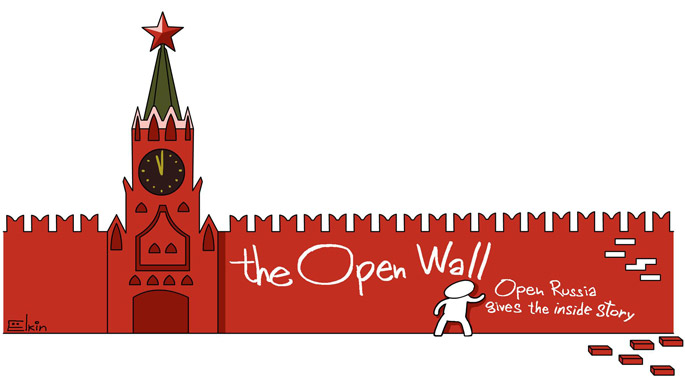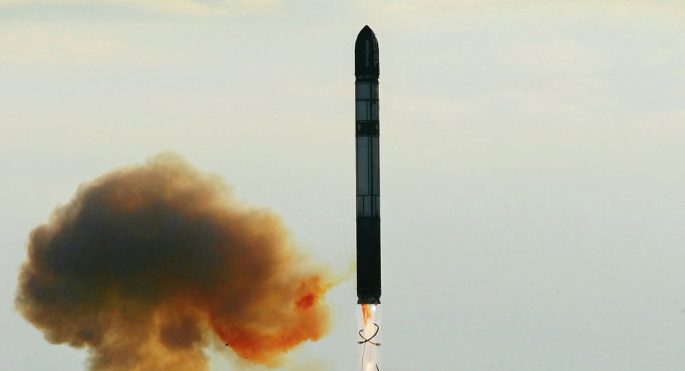“If we go down, we’re taking the rest of you with us”

“If we go down, we’re taking the rest of you with us.”
Russia is militarising – and doing so actively and ostentatiously.

“MINISTRY OF DEFENCE SECURES RIGHT TO TAKE OVER PRIVATE BAKERIES AND SERVICE STATIONS” – such was the headline of an October 18 Izvestia report about the latest war preparations. The report states that “the new rules apply to a wide range of organisations, from private bakeries, studios and service garages to meat-and-dairy holdings, regional auto repair services and major logistics companies.” In theory, this list of organisations could become even more comprehensive in due course – who’s to say it won’t eventually feature private mobile phone operators and oil companies?
Search Yandex for the term “bomb shelter” and you’ll find links to a whole host of disturbing materials. A kindergarten with a 57-metre-deep shelter has apparently opened in Yekaterinburg, for example, while the Ministry of Emergency Situations has insisted that the bomb shelters of Moscow can accommodate the “capital’s entire population.” After the federal channels picked up the latter story, the denizens of Russia’s regions began to grow increasingly perturbed and set about writing appeals to their local officials: “Ladies and gentlemen of the Donetsk (Rostov Region) administration, what contingencies do we have in place for this sort of situation? Or is the primary objective just to save Moscow, as per usual? At the end of the day, we live right on the border!”
With the threat of military conflict hanging so heavily in the air, the news that the Governor of St Petersburg has approved a plan to ensure daily emergency rations of 300 grammes of bread for each of the city’s 5 million residents couldn’t have failed to become a sensation. The Mayor’s Office was forced into a hasty explanation: the documents signed off by the governor, it insisted, related to nothing more than administrative routine, but by then it wasn’t the “bread question” that ought to have been on the discussion agenda, but people’s willingness to believe in the very possibility of a looming war. “Even a short while ago this sort of news would’ve brought a smile to people’s lips,” wrote gallery owner Marat Gelman. “What war? Against whom?” Now, however, those selfsame people seem to have grown fully accustomed to the prospect of bloodshed on a large scale.
In the eyes of writer Boris Akunin, the Kremlin’s war preparations are nothing if not painfully familiar: “The overall message being sent out by the state propaganda machine is all too clear: they’re impersonating loons, showing the whole world that if the crap really hits the fan, they’re not about to go easy on themselves or anyone else. As in, if we go down, we’re taking the rest of you with us. I remember these hysterical overtones from the Cold War days. It’s disturbing nonetheless. But more nauseating than anything else.”
Some Russian netizens, meanwhile, have reacted to ongoing events with a healthy dose of irony and sarcasm:
(Rosa) “Our leaders aren’t only guaranteeing us citizens a 300-gramme helping of bread in the event of war, they’re doing their utmost to guarantee us a helping of war itself”
(Stalingulag): “You get 300 grammes of bread and a place in the bomb shelter while Putin’s security guard gets a 10-million-euro apartment. He’s a patriot, you’re radioactive ash”
Meanwhile, Russia is engaging in military exercises of ever greater verisimilitude; these have now come to involve the Ministries of Communications, Finance and Industry, the Federal Agency for State Reserves, and the Bank of Russia, all of which are in training to work together in wartime conditions.
Warmongering is in the air. Economist and presidential adviser Sergei Glaziev is convinced that the American oligarchy is waging a total hybrid war against the entire world, and that Russia must not appease the aggressor under any circumstances: “Losing as it is to China, the United States is orchestrating a war against the ‘weak link’ of Russia. […] Experts understand that the whole of Western geopolitics was originally honed to stand up to Russia. I would go so far as to describe the Western school of geopolitics as a pseudoscience dedicated to developing methods of destroying Russia.”
Yet, for all their bluster about a military confrontation with the West, these hotheads are loath to make mention of Russia’s technological dependence on those selfsame Western powers. Genuine experts, conversely, are only too well aware of the seriousness of this problem. Leonid Orlenko, a professor at Moscow State Technical University, maintains that comprehensive import substitution in the economy’s high-tech sectors won’t be a realistic prospect for a good twenty years: “In our machine-tool industry, the share of foreign-made products currently exceeds 90%. It hovers at around 80-90% in the radio electronics industry. According to the Ministry of Industry and Trade, these figures could realistically be reduced to 50-60% by 2020.”
Aviaprom General Director Viktor Kuznetsov, whose company is engaged, among other things, in the technical modernisation of military aircraft factories, makes much the same point: “Import substitution is progressing very slowly: Russia’s aircraft manufacturers are still highly dependent on foreign components and materials.”
Facts like these, however, are easily lost in an atmosphere of escalating rhetoric, one that the Western media is happily fuelling. It has become a truism to say that the Kremlin lacks any other instruments for the mobilisation of society: waging battle against external enemies is the only weapon in its armoury, as well as being the only way of distracting the attention of its citizens from the rapidly deteriorating state of the economy. But war is governed by a logic all its own and choreographing that logic is possible only to a limited extent. Even bogus preparations for a bogus war serve to increase the likelihood of a genuine one.



